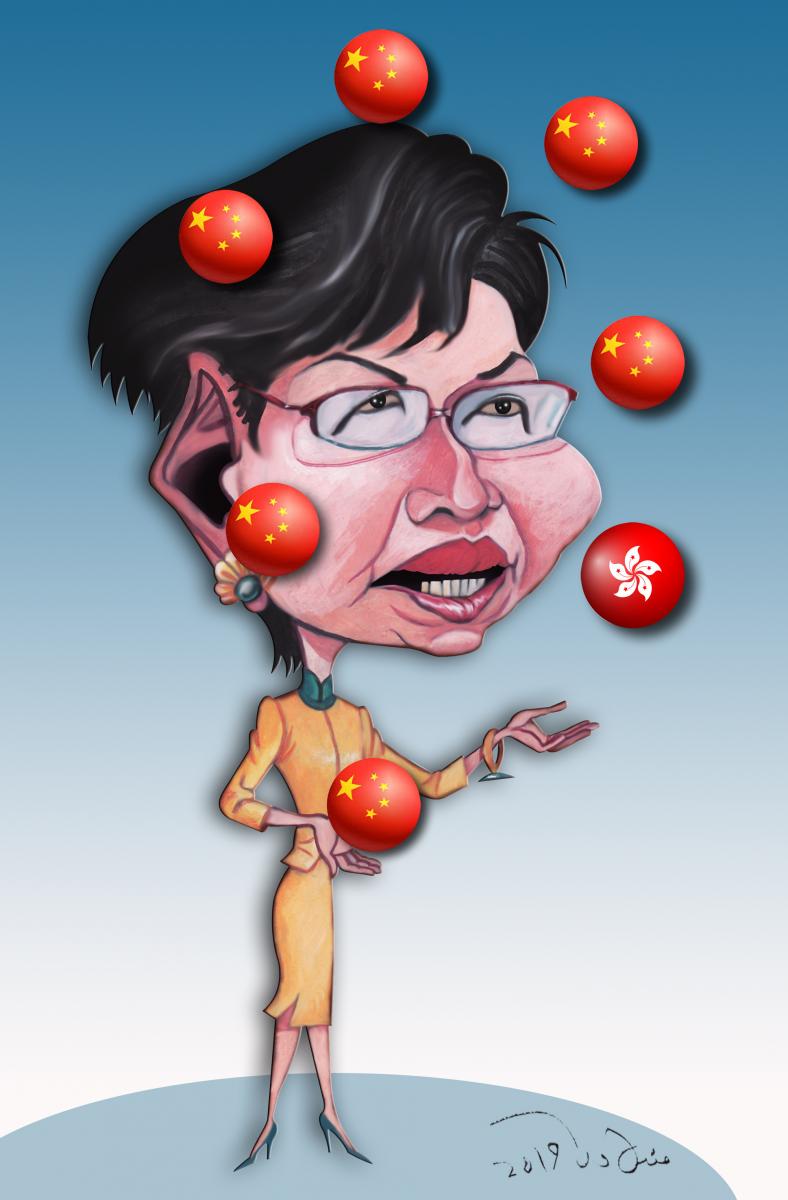
Carrie Lam, a Roman Catholic, was born in Hong Kong and comes from a working class background. 1982, as a civil servant, the Hong Kong government funded her one year-diploma course at Cambridge University, where she met her future husband, Chinese mathematician Lam Siu-por.
In 2004, she was appointed Director General of London Hong Kong Economics Trade Office – the city’s representation in the United Kingdom. She returned to Hong Kong in 2006 to take up the position of Permanent Secretary for Home Affairs, and climbed through the ranks. In 2007, Lam gave up her British nationality when she was appointed Secretary for Development by Chief Executive Donald Tsang, becoming one of the principal officials.
During the 2014 pro-democracy protests in Hong Kong, Lam served as Chief Secretary for Administration under then Chief Executive Leung Chun-ying. Protesters occupied key areas in Admiralty and Causeway Bay for 79 days. After the protests ended, she held talks with five student leaders. The talks focused on the students’ demands that China reconsider its ruling on how candidates for elections were chosen. She rejected the demands saying: “As far as their position is concerned I’m afraid we can only agree to disagree.”
In 2017, Lam was sworn into office by Chinese President Xi Jinping on the 20th anniversary of Hong Kong’s return of Beijing. In her acceptance speech she said: "Hong Kong, our home is suffering from quite a serious divisiveness and has accumulated a lot of frustrations. My priority will be to heal the divide." But pro-democracy supporters, who had widely contested Hong Kong’s election system during the 2014 Umbrella Movement, immediately warned of what was to come.
Ever since she was elected to her seat, fears have amplified that the city’s first female leader will aid Beijing in tightening its control over the city, effectively undermining the “one country, two systems” framework that guarantees Hong Kong its high degree of autonomy, including an independent justice system. These fears have been fuelled by several Beijing-tainted cases in recent years, including clandestine detention of five Hong Kong booksellers on the mainland and the suspected abduction of a Chinese tycoon in Hong Kong by mainland agents. Lam event went under the nickname “the nanny” for her complying loyalty to her Beijing-friendly bosses. She was also referred to as the “good fighter,” referring to her tough stance as she reportedly never backs down in a political battle, threatening to resign if she does not get her way.
But Lam’s time in office has been marred by her government’s push to make amendments to extradition bill proposed in 2019, which she argued was necessary to protect the city against criminals. It was introduced after a high-profile case where a Hong Long man was accused of murdering his girlfriend on holiday in Taiwan but could not be extradited. However many people felt the law would open the city to the long arm of Mainland Chinese law and that Hongkongers could be victimised under the Mainland Chinese legal system.
On 9 June, a record high number of protesters marched in the streets against the extradition bill and called for Lam to step down; with protest organizers estimating over 1.03 million people attended the protest. Following violent clashes on June 10, Lam spoke the following morning, admitting that the size of the rally showed there were "clearly still concerns" but refused to withdraw the bill. On 16 June, nearly two million protesters, as claimed by the organisers, flooded the streets demanding a full withdrawal of the bill. The government issued a statement in the evening where Carrie Lam apologised to Hong Kong residents and promised to "sincerely and humbly accept all criticism and to improve and serve the public" and passage of the bill was suspended. Protests continued throughout the summer of 2019 as protestors renewed demands for the complete withdrawal of the bill, free elections, an independent inquiry on police brutality, the release of arrested protesters and for the government to retract the characterization of the protests as "riots".
In early September 2019, the embattled leader finally fully withdrew the controversial bill, marking a dramatic U-turn for Lam, after denying that she had offered to resign over her handling of the crisis earlier in the same week after a recoding published of her at a meeting with business leaders was leaked to Reuters.
Amid the social upheaval, Lam saw her support in August 2019 fall to a record post-colonial low of 17 per cent, with those opposed hitting 76 per cent. Protesters do not trust Lam and have said they will continue to take to the streets until all their demands are met, with protests entering their 14th consecutive week last Sunday. On Sunday, protesters could be heard chanting, "Five demands, not one less."









